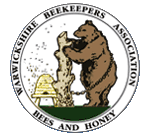SECRETARIAL REFLECTIONS
As 2022 draws to a close I can look back on my first nine months as Secretary of Nuneaton and Atherstone Beekeepers Association with a degree of satisfaction.
The club has grown in size, with 12 new members, leading to a total of over 50 members. We also have a new chair, Mathew Braker. The teaching apiary at Kings Lodge has been put to good use and sessions were well attended by new and established members alike. We have increased the number of colonies and we look forward to an even more productive year in 2023. The Queen Rearing Group has had a successful year, too.
Our WhatsApp chat group has continued to be a fast and efficient route for casual communicationfor the membership. But not all the membership wish to use it and so emails are sent through eR2.
The winter meetings are all booked and include an Xmas social with a quiz, a raffle, gluhwein and stollen – that should be fun.
As a new secretary I’ve found the WBKA website contact page to be an invaluable source of enquiries regarding bees, beekeeping and new membership. Most of our recent new members have come via this route. We have also had several companies ask how they can support their local beekeepers, through possible hive sponsorship and/or making land available for apiaries. Work on this progresses, but it seems to be a slow process. I’d be interested to hear from others who have had experience with hive sponsorship in particular. We will have to wait to see if the new BBKA’s “Beekeeping Near You” map generates as many enquiries.
And talking of the BBKA, like many of us, I receive calls via the “swarm removal” website. I’m sometimes amazed at what the public think we can do for them, and you can feel their
disappointment when I reply, for instance, that I’m not scaling a 30ft chimney for a “swarm” that’s been there for 4 years at least – to their knowledge.
Some of the more memorable of the calls included a person who wished to know what to do as the stain on her carpet had turned out to be honey seeping up from the wooden floor, and another call from a lady who was rather distressed to find bees flying out from underneath her whilst taking a bath. The initial picture in my mind dissolved with relief when told that she was not ringing me whilst still in the bath, but had already exited the bathroom and got dressed.
My garden apiary has seen a bumper honey harvest this year. However, my beekeeping has been rather stressful at times and the issues have centred around multiple diseases. This proved to be a source of useful knowledge when I took my Bee Health Module in the autumn, but I wish I had taken a typing course prior to the on-line exam as it turned out that my keyboard skills are
rubbish under pressure.
Early in the year my largest colony suddenly developed Chronic Bee Paralysis Virus, one week after I had performed an artificial swarm. I followed on-line advice to “raise the hive up and
remove the mesh floor to let the dead and dying bees drop out and not infect other bees” and after six weeks of sweeping away hundreds of dead bees from underneath, they recovered.
Interestingly, the original queen and her artificial swarm showed no signs of CBPV, and both colonies ultimately did well.
Unfortunately, later in the summer, I found a single hive with European Foul Brood during routine inspection. According to the bee inspector there were many cases of EFB infections in North
Warwickshire at that time, so I took some solace in that. The signs of EFB were limited to just one frame, but the inspector’s lateral flow device indicated a positive test with two lines appearing in mere seconds, just as my own test did when I caught Covid a few weeks later.
Well, I suppose if you can’t beat them, join them.
H A P P Y X M A S , E V E R Y B O D Y !
Julian Hull
